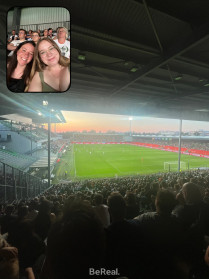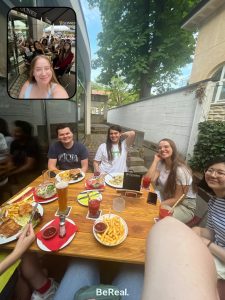Written by: Abi Jacobs | Spring 2023
BU Exchange at University of Tuebingen

Before I came to Germany, I was aware that in German they say “Freunde Finden” to describe the process of getting to know people and becoming friends. The literal translation of this is “finding friends,” which is very similar to the phrasing we use in English, “making friends.” These two phrases are almost identical, and as a student studying German at Butler, I did not give any real weight to the differences between the two, however, since coming to Germany, I have realized the importance of the minutiae in this instance. The difference between
“find” and “make” demonstrates the cultural difference in the way one makes friends in the US and in Germany. Similarly to the literal, linguistic difference, the practical difference is also very subtle, but for someone who came to Germany without friends, it became very clear to me. The process of forming friendships is very passive in Germany, like the word “find” is in comparison to that of “make.”
In the United States, especially at universities, I have found the process of making friends to be very intentional. As a first-year student, you come to Butler in part both nervous and excited about making new friends. In your orientation group, on your floor, and in your classes, you make conversation with people to figure out if you have similar interests or if you vibe with the other person. Even when you hit it off with a person without really trying, becoming friends with them beyond that involves effort. Even beyond university life, Americans in general are outgoing, especially when it comes to things like small talk. My hypothesis on the matter is that Americans value comfort above almost anything (take air-conditioning, leggings, and La-Z-Boy, for example) and for us, awkward silence is extremely uncomfortable. In Germany, I learned very quickly that small talk is not as popular. After my initial (failed) attempts when I first got here, the only times I made or heard small talk in Tübingen was when the bus or train was late.
Germans are kind and generous people, just not in the same way that Americans are. One of the things that Germans are not is outgoing. In the first few weeks that I was in Tübingen, I wondered quite often how German students in their first year here made friends. At colleges in the U.S., and especially at Butler, we have what I can only describe as friend-making infrastructure. Our RAs plan events for the floor, Butler University Programming Council holds events throughout the school year, and the entire point of Greek Life at Butler is to find a sisterhood or brotherhood of people to support you. Things such as these are decidedly absent from universities in Germany. Clubs exist at Tübingen University, but only ones that are academically or career focused. Between this and classes which only meet once a week, it is exceedingly difficult to get to know people at university, especially when extraverted Germans are few and far between.

Luckily, I found an American doing her master’s at Tübingen who understood my curiosity about how Germans make friends at university and could explain the process to me, as she had been there longer than I. She explained that often, Students already know people from their high school attending the same university before they come and generally stick to this group and become friends with each other’s friends and thus often do not feel the need to branch out much to make friends. Based on my own observations, a key ingredient in German-German friendships is proximity. Friendships are often formed through things like group projects or living situations, in which they are forced to interact with each other and by the time that the project is over, or their lease is up, a friendship has formed without much effort needed to create it, but as a by-product of a different relationship.
As the English phrase “making friends” suggests, we do not see the process as easy. It is work to “make” and keep friends. We begin each new interaction with the idea that we can become friends with this new person. We do not force friendships if they are unnatural, but if we get a good impression of each other, we try to improve our relationship. In Germany, it is a little bit different, as I have experienced and have tried to explain here. Germans have a mindset that says if two people are meant to be friends, it will happen. In American culture, friendships are an active process: they do not just fall into place, and that is why we use “make” to describe it.
 Like in any new situation, making friends in Germany was difficult. For me, it was more difficult than it was my first year at Butler. Upon reflection, I can now understand the cultural reasons behind this. In German culture, friendships develop passively. But I have made friends! I have made lifelong friends too, because another component of German culture is that once you are friends with a German, you will never not be friends with them. The phrase is not “make friends” nor “seek friends,” but “find friends”: It is something encountered, like a little kid with a shiny object. But after Germans find this shiny object, they will cherish it forever.
Like in any new situation, making friends in Germany was difficult. For me, it was more difficult than it was my first year at Butler. Upon reflection, I can now understand the cultural reasons behind this. In German culture, friendships develop passively. But I have made friends! I have made lifelong friends too, because another component of German culture is that once you are friends with a German, you will never not be friends with them. The phrase is not “make friends” nor “seek friends,” but “find friends”: It is something encountered, like a little kid with a shiny object. But after Germans find this shiny object, they will cherish it forever.

